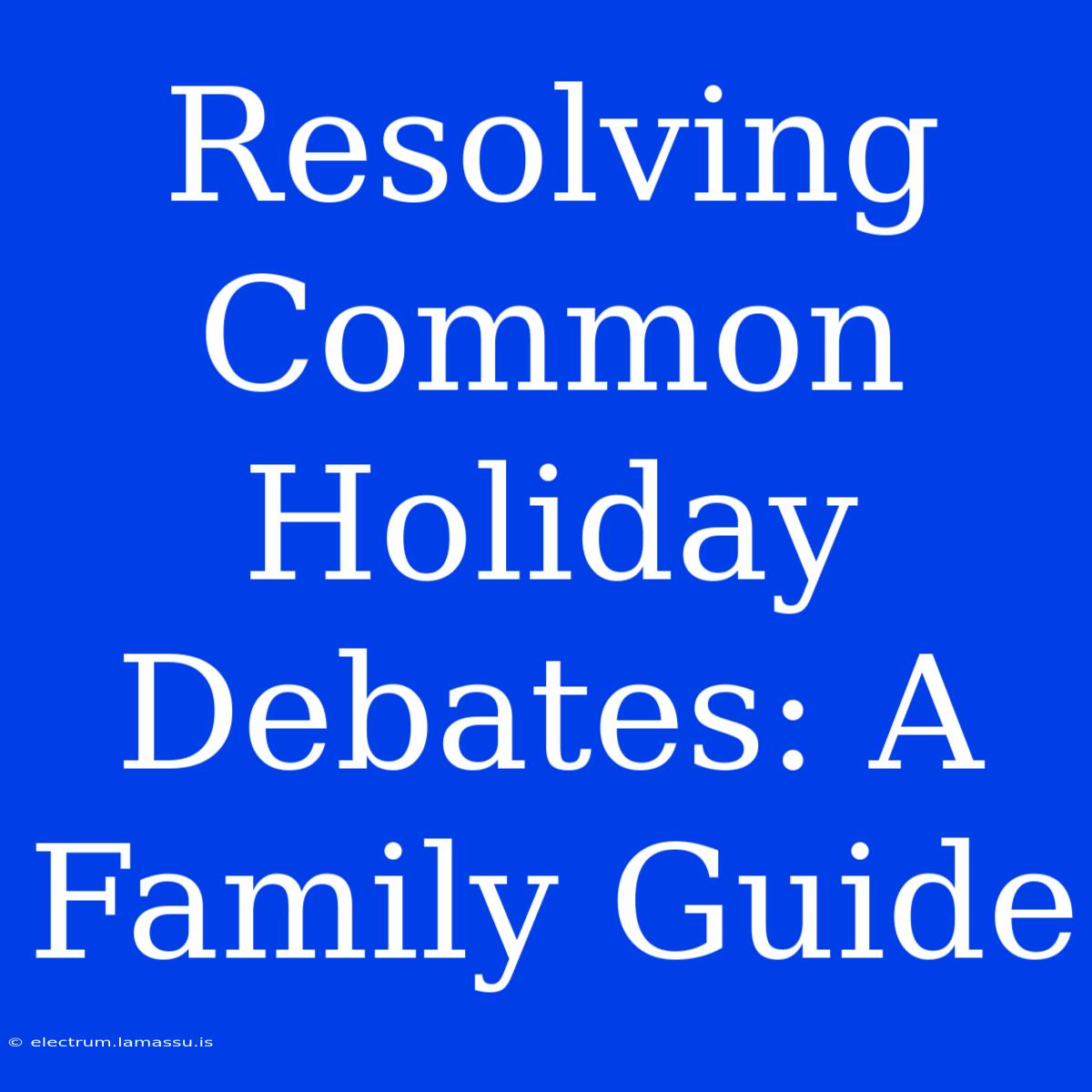Resolving Common Holiday Debates: A Family Guide
Is it even the holidays without a few spirited debates? From holiday traditions to gift-giving strategies, disagreements can quickly escalate during this festive season. But don't let holiday arguments overshadow the joy! This guide offers practical tips and insights to navigate common holiday debates and keep the peace.
Editor Note: This guide provides valuable insights for families seeking to foster harmonious holiday celebrations.
Why is this important? Maintaining family harmony during the holidays is essential for creating lasting memories and fostering a sense of togetherness. Understanding common debate points and learning effective strategies for resolution can significantly enhance holiday experiences for everyone.
Our analysis: We delved into the heart of holiday debates, researching common points of contention and gathering advice from family therapists and communication experts. This guide outlines key debate areas, provides actionable strategies, and emphasizes the importance of empathy and understanding.
Key Takeaways for Resolving Holiday Debates:
| Key Takeaway | Description |
|---|---|
| Empathy and Understanding | Listen actively to different perspectives, focusing on the emotions behind the opinions. |
| Open Communication | Create a safe space for open dialogue, where everyone can express their thoughts and feelings respectfully. |
| Finding Common Ground | Identify areas of agreement and build upon them to find mutually acceptable solutions. |
| Compromise and Flexibility | Be willing to compromise on some aspects to achieve harmony in the overall holiday experience. |
| Setting Boundaries | Establish clear expectations and boundaries to manage potential conflict points. |
Common Holiday Debates
1. Holiday Traditions:
Introduction: Holiday traditions are often deeply rooted in family history and personal values. It is essential to recognize the emotional significance of traditions and approach them with sensitivity.
Key Aspects:
- Honoring Heritage: Understanding the origins and meaning behind specific traditions can foster respect and appreciation.
- Balancing Old and New: Finding ways to integrate new traditions while honoring established ones can create a sense of continuity and growth.
- Flexibility and Compromise: Being open to modifications or adjustments to accommodate changing family dynamics.
Discussion: Traditions often evoke strong emotions and can be a source of conflict, especially when family dynamics change.
2. Gift Giving:
Introduction: Gift-giving is an integral part of the holidays, but navigating expectations and budgets can lead to stress and disagreements.
Key Aspects:
- Setting Realistic Expectations: Communicating budget limitations and preferences to avoid disappointment.
- Focusing on Meaningful Gifts: Prioritizing thoughtful and personalized gifts over expensive ones.
- Alternative Gift Ideas: Exploring creative alternatives such as homemade gifts, experiences, or charitable donations.
Discussion: Finding a balance between gift-giving and financial constraints can be challenging.
3. Travel and Logistics:
Introduction: Holiday travel and logistical arrangements can often lead to misunderstandings and conflict.
Key Aspects:
- Planning and Communication: Planning travel arrangements and accommodation in advance and ensuring clear communication among family members.
- Flexibility and Adaptability: Being prepared for unexpected travel delays or changes in plans.
- Respecting Individual Needs: Considering the needs and preferences of all family members involved in travel plans.
Discussion: Travel arrangements and logistics require careful planning and collaboration to ensure a smooth and enjoyable experience.
4. Family Dynamics:
Introduction: Navigating complex family relationships during the holidays can be challenging, requiring sensitivity and understanding.
Key Aspects:
- Recognizing Individual Differences: Acknowledging and respecting diverse perspectives and personalities within the family.
- Avoiding Controversial Topics: Setting boundaries and avoiding discussions that might lead to heated arguments.
- Focusing on Positive Interactions: Prioritizing quality time and creating opportunities for shared experiences.
Discussion: Family dynamics can be intricate, and the holidays can magnify existing tensions.
FAQ
Introduction: This section addresses common questions about resolving holiday debates.
Questions:
- Q: How can I handle a difficult family member who is always starting arguments?
- A: Setting firm boundaries and limiting contact with that individual during the holidays might be necessary.
- Q: What if I feel overwhelmed by all the holiday stress and pressure?
- A: Take time for self-care, communicate your needs, and consider delegating tasks or simplifying holiday plans.
- Q: My family disagrees about the type of holiday meal we should have. What can we do?
- A: Compromise by offering a selection of dishes that cater to different preferences.
- Q: What if my family disagrees on religious or political issues?
- A: Recognize that disagreements are normal and focus on shared values and holiday traditions.
- Q: How can I ensure everyone feels heard and respected during holiday gatherings?
- A: Practice active listening, acknowledge different viewpoints, and avoid interrupting or dismissing others.
- Q: What if my family members refuse to compromise?
- A: Consider seeking guidance from a therapist or counselor to facilitate open communication.
Tips for Resolving Holiday Debates
Introduction: This section provides practical tips to navigate common holiday debates effectively.
Tips:
- Schedule Family Meetings: Regularly scheduled family meetings allow for open communication and the addressing of potential conflict points before they escalate.
- Use "I" Statements: Communicating personal feelings and needs using "I" statements promotes empathy and reduces defensiveness.
- Practice Active Listening: Pay full attention when others are speaking, focusing on their perspectives and avoiding interrupting or offering unsolicited advice.
- Focus on Solutions: Rather than focusing on blame, focus on finding solutions and collaborating to find common ground.
- Take Breaks: If discussions become heated, take a break and regroup to calm down and approach the conversation with a fresh perspective.
Summary of Resolving Holiday Debates:
This guide offered insights and practical strategies for resolving common holiday debates. Remember, empathy, communication, and compromise are key to navigating these challenges effectively.
Closing Message: The holidays are a time for celebration, connection, and creating lasting memories. By embracing understanding and open communication, families can create a harmonious holiday environment filled with love and joy.

